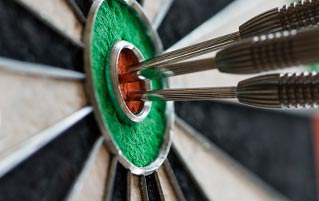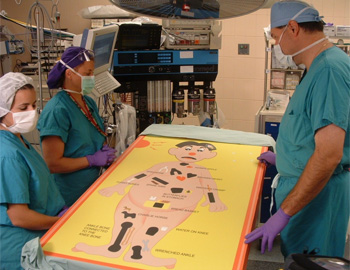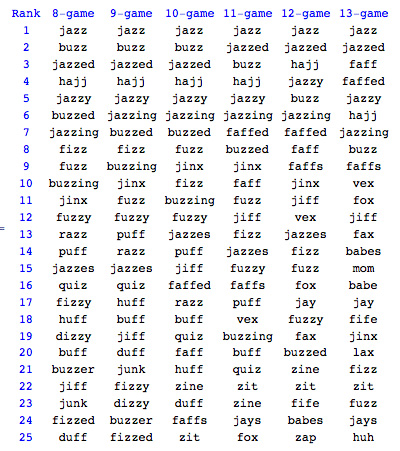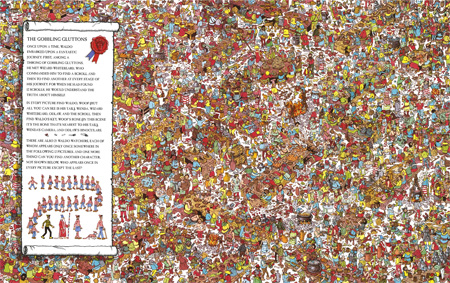5 Mathematical Strategies For Dominating Popular Games

If you're reading this, the odds are you're a hyper-competitive, Type-A personality who'd literally rather die than suffer even the most inconsequential loss. You don't play games for amusement -- you play to establish utter dominance.
Good news: The world is full of experts researching ways to ruthlessly gain every possible advantage in even the most light-hearted of games:
In Darts, Aim To The Lower Left
If you hand a toddler a dart, he'll assume he's supposed to hit the bull's-eye (or he'll launch it at the cat -- try it and see!). But experienced players know that the convoluted dartboard-scoring system means the real goal is several inches above it. So that's where you aim, right?
Not so fast, cowboy. This game, like life, is all about knowing when to lower your expectations.
The Trick:
Oh, sure, champion dart players are going to shoot for the "triple 20" -- the second narrow band down from the top, which is worth 60 points (where the bull's-eye is only worth 50, even though it's a smaller target). But that's not you, because otherwise you wouldn't be reading this.

"I'll give you a million points if you stop making holes in my wall."
Let's say you're merely pretty good at darts, because you didn't waste your youth becoming great at it (you wasted it on other things). Then you run into trouble, because missing the triple 20 means you're just as likely to land on 5 or 1. That's why the board is designed that way -- it's risk versus reward.
So is that when you aim for the bull's-eye instead? Science says no. Forget about the goddamn bull's-eye, it's a red herring. Mathematicians ran some simulations of dart games where the player's skill level is assigned a value, with a lower number being better (it wouldn't be science if it wasn't a bit confusing). When they plugged in the numbers, the graph of the best place to aim according to your skill level looks like this:

They had similar conclusions in their urinal aim chart too.
If you're a great darts player (what they're labeling levels 1-16) and can very reasonably expect to hit triple 20, go for it -- the occasional miss won't cost you much. But if you're slightly below expert (anything above a "17" on their scale), the best place to aim switches to the lower left, starting at triple 19 and moving up toward the center from there. As your aim becomes more erratic, throwing at this line maximizes your chances of hitting something worthwhile.
And you'll notice it only becomes tactically beneficial to aim for the bull's-eye when your skill level is ludicrously high (which on their scale means you suck so much you're a legitimate danger to injure someone). Even then, that's not because you might hit it -- that just maximizes your chances of hitting the board at all, rather spastically flailing the projectile toward your best friend's eye.
There's A Technique For Keeping A Steady Hand In Operation (Or Real Surgery, We Suppose)
Operation might just be the most frightening game we played when we were children. We still hear that harsh buzzing noise in our nightmares, a sound that to our ears was the anguished screams of the patient we had just maimed. It's even worse for adults trying to play a friendly game with kids, because we have the disadvantages of deteriorating nerves and alcoholism weighing on us.

Not to mention the anxiety that comes with wondering what any real medical procedure is going to cost.
But there is a strategy for improving your game that doesn't involve throwing down a couple of shots when the kids aren't looking.
The Trick:
In his book, How To Win Games And Beat People, journalist Tom Whipple devised a number of strategies for beating popular games, not by asking champions of the games themselves, but by equivalent "experts" in related real-life fields. Naturally, for Operation, he asked a surgeon, who told him this:

"How the hell did you get in here?!"
Grip the tweezers with your thumb and ring finger, rather than like a pencil. Tuck your elbow in close to your body. If you're standing, stand with your legs apart. If you still have a case of trembles, brace your wrist with the other hand.
Despite the popular perception, surgeons aren't all machines, and they're just as susceptible to the shakes as the rest of us. These are apparently genuine techniques that real surgeons use to maximize steadiness for delicate work. Naturally, the same skill crosses over to a silly game where you try to pull a horse out of a guy's knee.

Okay, now you're just cheating.
It probably doesn't make you qualified to do actual surgery, so you shouldn't use this technique on a human patient unless it's one of those deals where a wounded mob hitman is making you do it at gunpoint.
Destroy Any Child In Hangman
Okay, everyone probably already knows the best method for winning a game of Hangman, the only spelling game we know about that ends with someone dying. It's just like Wheel of Fortune -- you pick the most common letters in the alphabet first, right? Well, it's a little more complicated than that, but in the strict sense, yes, that's the way to do it.

"THIS IS NO WAY TO ADMINISTER JUSTICE!"
But wait! That's just half the story. In 2010, mathematician Jon McLoone was working on creating an "unbeatable" Hangman program, and testing it on his 6-year-old daughter (note: being the child of a scientist is hell) when the young Ms. McLoone asked an obvious and yet surprisingly rare question -- how do you beat the game if you're the one picking the words?
Hours of math later, he figured out the answer to that, too.
The Trick:
The short answer is "jazz."
No, that's it, that's the single most difficult word in the English dictionary to guess in a game of Hangman, as proven by reams of algorithms and calculations and graphs and computers going beep a lot.

Not to mention the bubbling beakers.
Now here's the long answer:
You probably expect that the best words are going to be fairly long ones, like onomatopoeia or some equally obnoxious choice. But it turns out that choosing longer words actually makes them easier to guess. First of all, long words tend to be jam-packed with vowels -- which are always among those first letters that literally everyone guesses right off the bat.

Plus, nobody can spell "onomatopoeia" without cheating anyway.
What you really want to do is go for smaller words with the maximum number of the least common letters, things like Z, X, Q, and J. Because every correct guess gives the player another clue about the answer, you want to minimize the number of potential clues, which means picking the shortest word possible.
An added complication is that there's no universal rule about how you draw the titular "hangman" -- the number of wrong guesses you're allowed to have depends on the complexity of the drawing, and most games range between 8-13 parts (you're remembering the genitalia, right?). McLoone took this into account with his calculations and, after running 90,000 words through his algorithms, he concluded with this:

"Now we just have to wait for someone to make this into a game show."
According to his calculations, it doesn't matter how long the game is, you just can't do any better than "jazz." It ranks even higher than "hajj" even though there's a good chance your 6-year-old victim won't even know what that is.
Maximize Your Where's Waldo? Efficiency
In the 1980s, illustrator Martin Handford invented an excellent method for getting your kids to shut up for half an hour by making them search through a crowd of people for the guy with the worst fashion sense. But if you want to miss the entire point of Where's Waldo? (or Wally, as he's known in Britain) and skip straight to the satisfaction, science has unlocked the method that will maximize your chances of ruining your own fun.

Good thing they changed the name, otherwise Americans would have had no clue what to do.
The Trick:
Waldo's hiding spots might seem random, but as mathematician Ben Blatt for some reason discovered, there are patterns that he relies on. After poring through dozens of Waldo puzzles, Blatt figured out that, over half the time, Waldo is hidden in one of two narrow bands across the top or bottom halves of the page.

Now just print this out on to a transparency and it's off to the library!
Why? Well, if we're to speculate on what Handford is thinking, he probably avoids putting Waldo along the edges or in the center because those are the first places you're going to look. In fact, Blatt found that Waldo has only ever hidden in the top left part of the page once in the entire history of the franchise.
Which makes sense because if you're accustomed to this thing called reading, which you probably are if you're actually parsing this article at all, that's where your eyes automatically go first. So, if you want to take a tactical approach to Waldo-spotting, you can mostly ignore that whole quadrant -- the artist would not be such a fool. The books usually cover up most of that part of the image with a block of text anyway, for those few kids who are interested in the "story" of Waldo.

"The hotel room smelled of cheap cigarettes and even cheaper bourbon. Waldo cut a line on the dresser."
To further refine the strategy, data scientist Randal Olson went so far as to create an algorithm based on Blatt's data that would calculate the optimal search path for finding the world's ugliest sweater and beanie combo. It looks like this:

This can also be a template for those awful Family Circus comics.
Follow the black line, and you'll find Waldo in just seconds. "Not so smart now, are you, you striped piece of shit!"
You Can Lessen Your Chances Of Getting Humiliated In A Game Of HORSE
Horse (or H.O.R.S.E., we suppose) is a game played on a basketball court where two or more players take turns shooting at the basket in whatever way they see fit. The trick is, after you make a shot, your opponents have to try to make their shot in exactly the same way, standing in exactly the same position. If they fail, they are penalized with a letter, until they have enough to spell out the word H-O-R-S-E, at which point they are eliminated and pelted with basketballs until they are dead. The reason the word "horse" was selected is lost to the sands of time.

Because "goddammit" made the games too long.
The Trick:
Now, you'd think that if you're really good at shooting hoops, then your best strategy is to pull out all your most difficult trick shots. You should be banking that shit off the neighbor's minivan in the driveway, then watching your opponents all fail hilariously. Likewise, if you're not very good, you're better off playing it safe -- that's basically the darts strategy we laid out earlier, right? But according to hard math, this is exactly backwards: Really good players are better off making easy shots, and really shitty players are better off attempting crazy trick shots.
This was figured out by Ben Blatt again, you know, the Waldo cheater, like he doesn't have any more important math to do with his crazy numbers brain. According to him, the secret is this:

AH, MATH! KILL IT!
Don't panic, we're not going to try to break that down. But here's what it basically shows in lay terms:
No matter your skill level, your mission is to maximize your opponents' failures. If you're the best player on the court, the best tactic is to make shots that, while not too easy, are still below your ability -- playing it safe. This might draw the game out, but given enough time, your opponents' misses will outnumber yours. This is about winning, after all, not about having fun.

Aren't victories by attrition made all the sweeter by the endless tedium?
If you're the least-skilled player ... here's the bad news, you're still probably going to lose, but to maximize your chances, your best strategy is actually to take crazy difficult shots. This is because, according to the traditional rules, the player who selects the shot receives no penalty for missing. You only get a penalty if you're trying to copy a successful shot. So, in the unlikely event that you try a crazy trick shot and actually make the basket, you can wipe out your entire opposition in one fell swoop.
That said, Blatt admits that no amount of math can really do more for you here than just learning how to play basketball better. Is that perhaps a lesson we can apply to other areas of life? Eh, probably not.

"NBA, here I come!"
Federico enjoys writing about math and science-y stuff. Tell him to do just that for you by contacting him here. He still uses that email to remind himself that you make terrible decisions when you're young.
Also check out The 9 Most Insane Board Games Of All Time and 5 Much Better Alternatives To Famous Board Games.
Subscribe to our YouTube channel, and check out Why the Board Game 'Guess Who' Is Getting More Racist, and other videos you won't see on the site!
Follow us on Facebook, and we'll follow you everywhere.
Gear up for a very important mission with The Guardians Of The Galaxy with this adorable Groot tee. Or show off your quiet intensity in this nifty Drax shirt. Hurry, the universe NEEDS you.